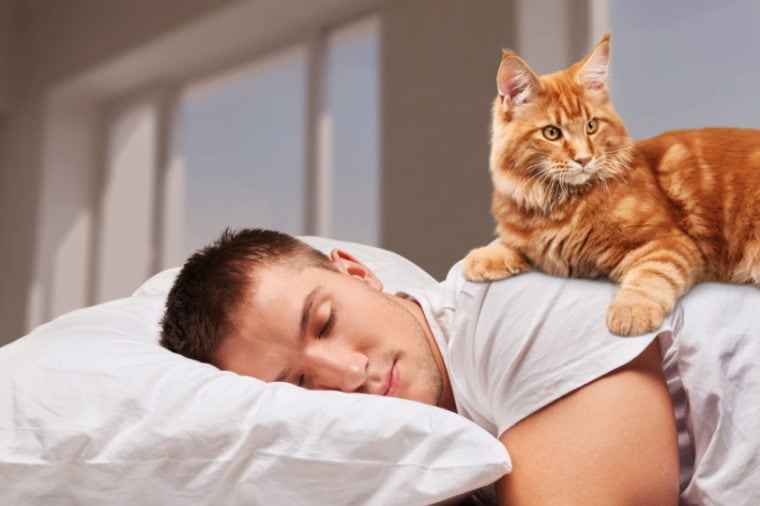
Happy, healthy, and content cats typically use their litter box when they need to go potty; however, any cat may start to pee inappropriately. If your feline is exhibiting strange urination patterns, it may include them peeing on your bed or on you while you sleep. This can happen due to medical problems, stress, and various other reasons, so it’s crucial to know when and how to react. No matter what you do, be gentle with your cat when these mishaps happen, as they’re typically signs that something is off with your feline.
Read on to learn more about the possible reasons for inappropriate peeing in cats, why your cat peed on you while you slept, and how to keep your cat from peeing on your bed.
The 6 Reasons That Your Cat Might Be Peeing on You While You Sleep
1. Your Cat Is Experiencing Underlying Health Problems
Various medical issues can affect your cat’s bladder and kidneys, leading to irregular peeing patterns and your cat urinating in odd places.
Here’s a list of common health problems in cats that can lead to your cat peeing on you while sleeping:1
It’s also possible for your cat to experience other health issues, such as joint pain, that cause discomfort and prevent your feline from going in the litter box.
If you suspect that an underlying health problem in your cat is the reason that your cat peed on you while you were sleeping, it’s best to consult your veterinarian. They will perform the needed testing, clarify your concerns, and offer treatment options if necessary.
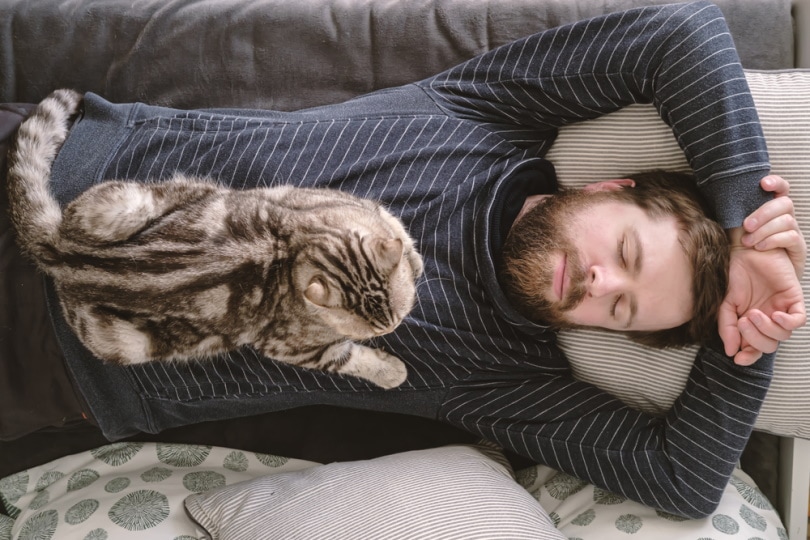
2. Your Cat Is Scared, Stressed, or Anxious
Felines can feel scared, stressed, anxious, or fearful for various reasons, and stress may lead to the cat peeing on you while you’re sleeping. It’s common for stressed and anxious cats to display all kinds of strange behaviors and signs,2 including:
Since stress can lead to your cat peeing in the wrong place, it may be the reason that your cat peed on you while you were sleeping.
Knowing that anxiousness and stress can damage your cat’s quality of life and lead to more health problems along the way, it’s essential to learn how to help your feline feel calm and peaceful.
3. Your Feline Is Dealing With Environmental Changes
Cats may go outside of their litter box and accidentally urinate on you during bedtime when they’re dealing with environmental changes.3 These changes can represent anything from having a new baby, getting a new pet, or moving to a new home.
Cats function best in environments that are known and predictable; even minor household changes can cause your cat to exhibit various negative behaviors. As a way of protesting and trying to keep up with the changes, your cat may pee anywhere in the home to mark their territory and try to feel safer and calmer.
Since environmental changes can significantly impact your cat, endeavor to help your cat adapt to their new surroundings to prevent negative behaviors like urinating in the wrong places—unless you want to wash your sheets every day!
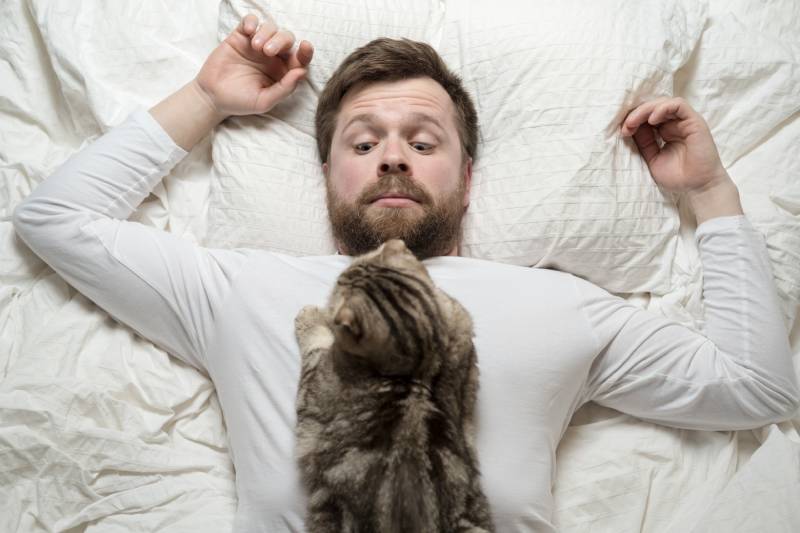
4. Your Cat Doesn’t Like the Litter or the Litter Box
Cats can urinate in inappropriate areas when they dislike their litter and litter box. If you’ve bought an unsuitable type of litter box for your cat, they may be deterred and urinate in other spots, including your bed, while you sleep. This can happen when the litter box is too large/small, uncomfortable, or simply ill-fitted.
Also, your feline may pee on you while you sleep if you change their litter type; most cats get used to a particular type of litter, so if you decide to switch it up, you may notice changes in your cat’s urination patterns.
So, if your cat peed on you while you were sleeping, ensure that the litter box and litter are suitable and not preventing your feline from using the litter box.
5. The Litterbox Is Hard to Reach
Cats need a peaceful area to do their business, so their litter box needs to be in a quiet, easy-to-access space that doesn’t have much foot traffic. If you place your cat’s litter box in a hard-to-reach spot where there’s noise or people, your feline may be deterred from using it and may urinate in other places instead, such as on you while you sleep.
Since the position of the litter box may lead to involuntary peeing around the home, try to place multiple litter boxes in areas where your cat likes to spend time to prevent mishaps from happening.
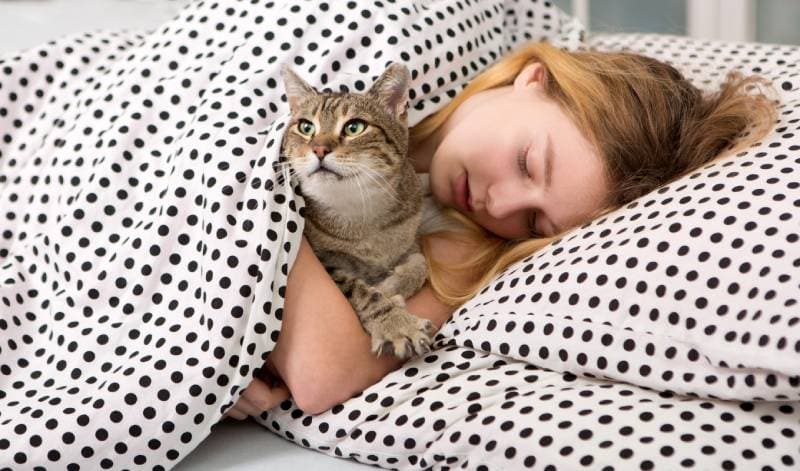
6. Your Cat Is Spraying or Marking
Cats will often spray or mark their spots and territory as a way to enrich their environment with familiar smells. When cats engage in this behavior, they typically mark vertical surfaces by raising their tail and releasing a small amount of urine. However, it’s also possible for cats to occasionally mark horizontal surfaces.
Although all cats are capable of marking, this behavior is particularly noticeable in unneutered males and females. Spraying/marking can often be a hard habit to break, but you can try neutering your cat to reduce the chances of these territorial mishaps.
When Should You Speak With Your Vet About This Issue?
If your feline has suddenly started urinating in odd places and peeing on you while you sleep, the underlying cause of the issue may be medical, so it’s best to schedule a vet check-up to see if everything is okay with your cat.
Inappropriate and involuntary urination in cats can occur due to minor health issues, such as UTIs, but it can also indicate more significant health problems, such as diabetes and kidney issues. Therefore, it’s better to be safe than sorry; have your cat checked and tested by your vet to ensure that everything is okay with their health. If there are no medical problems, you can seek advice on how to handle your cat’s urination problem.
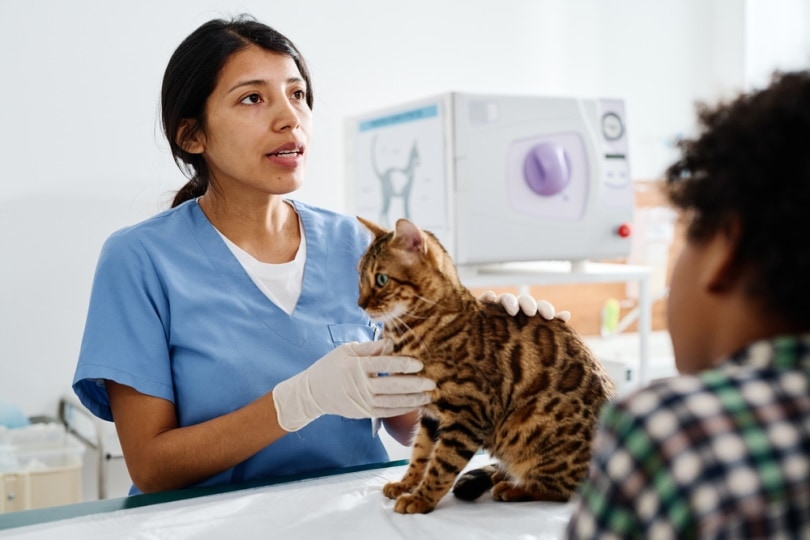
How to Prevent Your Cat From Peeing on Your Bed While You Sleep
Since having your cat pee on your bed or any other spot in your home can be frustrating and unsanitary, it’s essential to learn how to prevent your cat from engaging in such behavior.
Helping your cat live in a calm and peaceful environment will have an overall positive impact and likely stop unwanted behaviors like peeing inappropriately.
Conclusion
Although having your cat pee on you while you sleep can be extremely annoying or uncomfortable, it’s essential to approach this problem calmly and help your cat instead of punishing them.
Ensure that your cat gets the needed vet check-up, provide a suitable litter box and litter, and help your cat adjust to any changes in your household. By showing love, kindness, and patience to your cat, you should have no problems correcting this behavior.
Featured Image Credit: Billion Photos, Shutterstock






